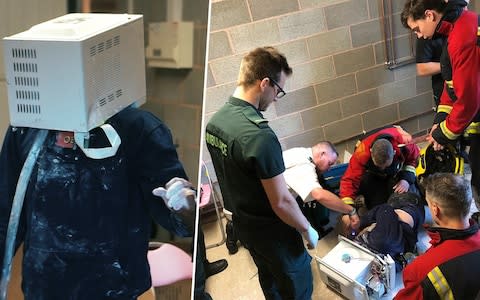YouTube bans dangerous and 'emotionally distressing' pranks following string of controversies

YouTube has banned prank videos from its site amid fears users are putting each other in danger and "traumatising" children
The video sharing giant said clips showing "dangerous" stunts, especially under the guise of viral ‘challenges’, “have no place on YouTube”.
The Google-owned company announced it is also extending the ban to pranks that made people think they are in imminent “physical danger” or caused “emotional distress to children”.
YouTube cited examples of such videos as ones where people where made to think they were victims of a home invasion or a child being told a parent had died.
The move comes after a series of dangerous viral ‘challenges’ on the site, one of which has prompted the British Transport Police to open an investigation after a teenage vlogger was seen walking across train tracks blindfolded.

A spokesman said: “YouTube is home to many beloved viral challenges and pranks, like Jimmy Kimmel’s Terrible Christmas Presents prank or the water bottle flip challenge.
“That said, we’ve always had policies to make sure what’s funny doesn’t cross the line into also being harmful or dangerous.
“Our Community Guidelines prohibit content that encourages dangerous activities that are likely to result in serious harm, and today clarifying what this means for dangerous challenges and pranks.”
In the past YouTube has tried to discourage vloggers from attempting dangerous pranks by demonetising the videos.
However, it has failed to dissuade some on its platform who see such stunts as a way to gain viral fame, with some attempts leading to tragedy.
Last year a 20-year-old woman from Minnesota was jailed for six months after she shot her boyfriend dead while attempting to show a thick book could stop a bullet from a high-calibre pistol.
The company has also struggled to suppress the spread of dangerous ‘challenges’ that have seen vloggers eating detergent capsules and setting fire to themselves.
YouTube was criticised earlier this month after another dangerous challenge sprung up which saw people recreating scenes from the Netflix film Bird Box.
The Sandra Bullock horror blockbuster shows people living blindfolded in a post-apocalyptic world to avoid a demonic spirit that kills people who make eye-contact with it.
In recent weeks, the YouTube Bird Box Challenge has seen people attempting to cook and drive blindfolded with one crash in the US being attributed to it.
Bird Box Challenge while driving...predictable result. This happened on Monday as a result of the driver covering her eyes while driving on Layton Parkway. Luckily no injuries. pic.twitter.com/4DvYzrmDA2
— Layton Police (@laytonpolice) January 11, 2019
This week UK police opened an investigation after YouTuber Ben Phillips blindfolded his half-brother Elliot Giles and filmed him trespassing on the railway as part of the challenge. The British Transport Police said it was concerned there “could be copycat attempts" following the video.
In recent years there have also been a number of incidents in the UK where emergency services have been called after YouTube stunts and pranks went wrong.
In 2017 Firefighters spent an hour freeing a vlogger in Wolverhampton who cemented his head into a mircowave for his YouTube viewers.
YouTube's decision was welcomed as a "good first step" by UK children's and accident prevention charities, but the company was urged to do more to prevent the spread of dangerous content.
A spokesman for the Royal Society for the Prevention of Accidents said: “It’s a good first step. Content platforms should also consider switching off paid-for advertising for these types of videos that are under review. RoSPA is concerned about copycats, and hopes other content platforms will consider adopting similar rules.”
Tony Stower, NSPCC Head of Child Safety Online, added: "Over and over again YouTube has claimed they will do more to protect children from disturbing videos and yet we appear to find ourselves in the same situation where it can be all too easy for young people to find inappropriate content.
"Tech giants have a responsibility to protect children on their platforms. YouTube have committed to cleaning up their site and banning videos that violate their policies but it’s no good just saying it; they need to act on it."

 Yahoo News
Yahoo News 
